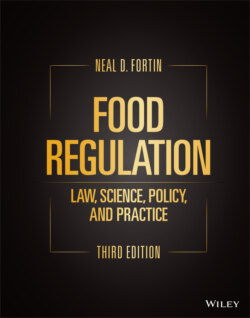Читать книгу Food Regulation - Neal D. Fortin - Страница 11
Оглавление
FOREWORD
WHAT IS FOOD LAW?
“What is food law?” may be a surprising question in a book titled Food Regulation. When I entered this field, the answer was a simple one. “Food law” meant the regulation of food. Food law had two main audiences: lawyers and the regulated food industries. At the universities, these audiences were reflected in courses at law schools and in food science departments. Food law was not a stand‐alone course at law schools but rather was a subset of food and drug law courses. There it dealt largely with the regulation of food by the Food and Drug Administration (FDA). In food science departments, the food law courses covered the law that the regulated food businesses needed to know, mostly the regulation by FDA, the U.S. Department of Agriculture (USDA), and related state agencies.
This traditional approach to food law remains important today, and this book largely follows that traditional meaning of food law as the law that directly regulates food or food regulatory law. Foremost, food regulatory law remains the main practice area for attorneys involved in food law and the main interest of professionals working in the food industry.
In recent years, the question “What is food law?” has become more complex in part due to the growing food movements. Writers like Michael Pollan, Eric Schlosser, Greg Critser, and Barbara Kingsolver have brought new interest and attention to food and food policy. At the same time, a broader perception of the interconnectedness of food, agriculture, and law has emerged. As Wendell Berry observed, “Eating is an agricultural act.” Agricultural law affects our food, and thus in this sense, large swatches of agricultural law are sometimes called, “food law.” In addition, “food law” is sometimes broadened in meaning to include all law related in some way to food, such as environmental rules for farms and agricultural commodity price supports.
Unfortunately, the omnibus usage is confusing not only because it usurps the longstanding, common meaning of “food law” but also because it is misleading semantically, “Food law” is law that applies directly to food. This omnibus usage also can result in shallow understanding. Judge Frank Easterbrook talked of, The Law of the Horse, where, “Lots of cases deal with sales of horses; others deal with people kicked by horses; still more deal with the licensing and racing of horses, or with the care veterinarians give to horses, or with prizes at horse shows. Any effort to collect these strands into a course on ‘The Law of the Horse’ is doomed to be shallow and to miss unifying principles.”1
An especially important concern of Judge Easterbrook was that “The Law of the Horse” resulted in “courses suited to dilettantes.” He noted, “We are at risk of multidisciplinary dilettantism, or, as one of my mentors called it, the cross‐sterilization of ideas… . the worst of both worlds.”2
Accomplishment at legal scholarship perhaps more than other disciplines can imbue hubris regarding competence in other fields. Lawyers are not epidemiologists. Lawyers are not evolutionary biologists. Lawyers are not sociologists. And they should not live action role play them.
With the purpose of giving you the best of a single world, this book offers you a deep understanding of food law in the traditional sense. The traditional topic is a rich one and a rewarding one. I have endeavored to make this text interesting enough that you will not be tempted by the sirens’ call of the “law of food” dilettantism.
Neal D. Fortin
Spring 2022
Notes
1 1 Frank H. Easterbrook, Cyberspace and the Law of the Horse, U.Chi. Legal F. 207 (1996).
2 2 Id.
